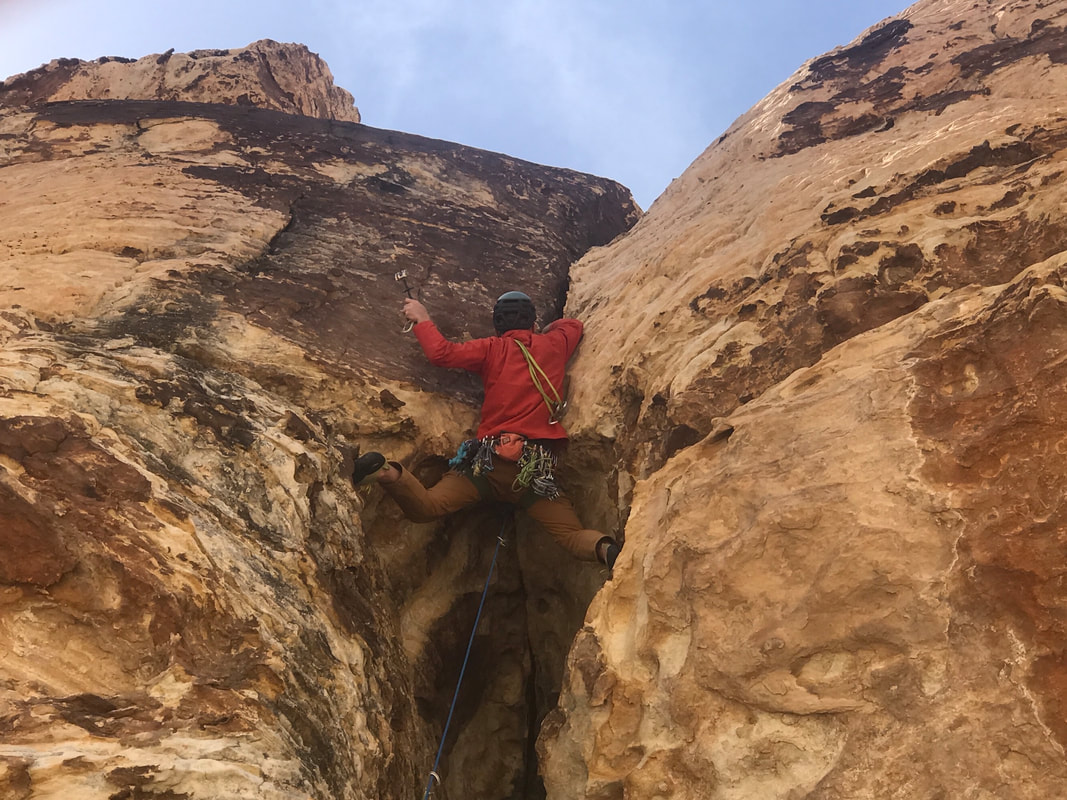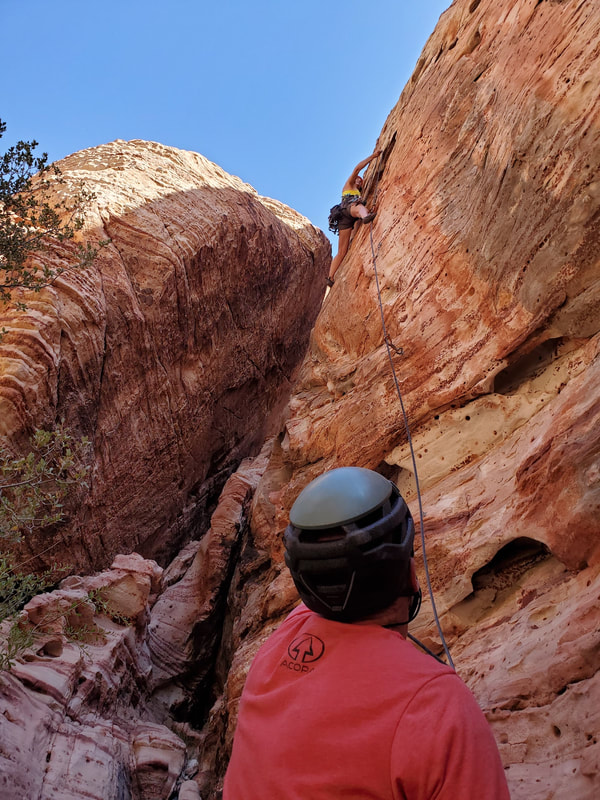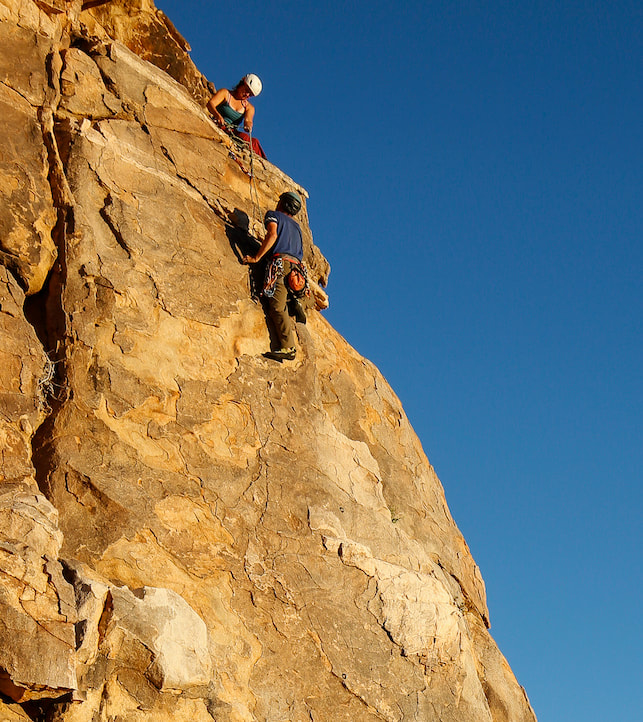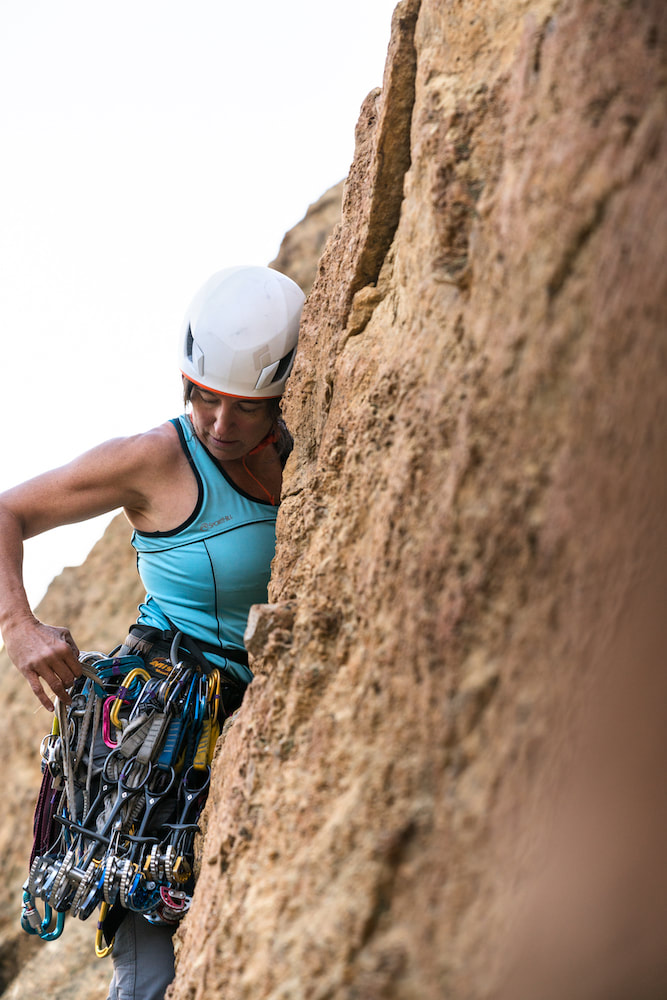Yes, I am going to say it, openly and without shame - my husband climbs stronger than me. I am also going to make an accompanying statement that I believe my realization (and open admission) do not fall under the "sexist" or "defeatist" umbrellas.
You have to read on to follow my logic, but, as you will see, it took me a couple of different personal explorations to reach the determination and acceptance that indeed, my husband climbs "stronger" than me. As I attempted to write this article, two personal perspectives emerged, each with her own tale, each equally valid.
I found I didn't want to censor one voice - both sides having something to say. And, although I initially tried to string them together into a single thread, the article didn’t flow - it didn’t make sense. So here, I present two tales in two different columns – take your pick, read one or both. You may relate to one, both, or neither. One, both, or neither may piss you off... And you may have completely different experiences and perspectives - yes, equally valid as well.
I begin both stories with: I’m a woman and I’m a climber.
You have to read on to follow my logic, but, as you will see, it took me a couple of different personal explorations to reach the determination and acceptance that indeed, my husband climbs "stronger" than me. As I attempted to write this article, two personal perspectives emerged, each with her own tale, each equally valid.
I found I didn't want to censor one voice - both sides having something to say. And, although I initially tried to string them together into a single thread, the article didn’t flow - it didn’t make sense. So here, I present two tales in two different columns – take your pick, read one or both. You may relate to one, both, or neither. One, both, or neither may piss you off... And you may have completely different experiences and perspectives - yes, equally valid as well.
I begin both stories with: I’m a woman and I’m a climber.
1I’m a woman and I’m a climber.
I am also, without a doubt, the physically “weaker” sex –really. I mean it. And, although I have fought it tooth-and-nail, wishing that it weren’t true, I have finally accepted this fact. I am weaker than my husband (and probably most other men.) Case-in-point: My husband and I are basically the same age, we climb the exact same locations, with the same frequency, for the same amount of time, the same number of climbs, and, for the most part, many of the same climbs. Yet, he is definitely stronger than I am – especially in upper body strength. Sometimes he can nail a route better because of his height (which also tends to be a male feature), but often it is simply due to pure strength. He can pull the roof move cleanly, I can’t. He can do a long sustained overhung climb cleanly, and I can’t. I have to rest, at least once, maybe even a few hundred times. Am I strong? Yes. But is he stronger? Absolutely.
And, now, it’s not just the overhanging climbs where he’s excelling. He is climbing away from me – progressing to a solid grade level above me. Bye-bye babe, I’ll try to catch up to you later. Can I caveat this “weaker thing” to hell and back? Yes. Of course. I can say things like:
I could try to seek out all of the ways I may be stronger than my husband - sometimes my mental game is on fire - but what purpose does that serve? Except maybe to placate my ego and put me in competition with my husband? There is no competition if I don't engage in it. I am who I am. I do what I can do. Are there holes you can poke in my “women have physically weaker upper body strength” argument? Sure. Margo Hayes, Lynn Hill, and many other killer women can kick my husband's ass in climbing. So what am I saying? Am I betraying women to sexist stereotypical bullshit? No. I’m facing up to my personal reality. I am tired of fighting myself thinking I should be able to crush that roof in the same way my husband does. The reality is I can’t. Does that mean I’ll never be able to climb at my husband’s level? No. But, honestly, I would have to work harder at it than he does. Everyone is capable of working their weaknesses and achieving a goal. Herein lies a key in the whole sexism debate. Sexism does NOT lie in recognizing the real physiological differences between women and men (after all, women have been fighting for the National Institutes of Health to increase the number of women in health studies for this very reason - we are physiologically different, medical research needs to acknowledge this). Rather, sexism lies in the perception of achievement and capability. If you couple the words “physically weaker” with the idea that she therefore cannot achieve, there is a problem - a big problem. That is sexist. |
2I’m a woman and I’m a climber.
I have lived with the same subtle and not so subtle messages our society sends to women. And, I have truly been affected by them. As a child I hated being a girl. Boys got to do the cool stuff. I was sent to Brownies (the Cub Scout version of Girl Scouts) and the first item on the agenda was how to change an f*ing diaper. Really? I’m 7. Why can’t I learn to tie knots, camp, start a fire, and climb a tree like the boys? I refused to attend another “Brownie” session. As a teenager I worked in construction and in a cabinet shop. I was the only female. The sex jokes and lewd comments were incessant. Some were funny and rather innocent - I could laugh them off. Others were not so innocuous. I was a great cabinet- and furniture-maker - creative and giving attention to detail – but I quit. Things got too scary with some of “the boys.” It happened again when I tried to get into the field of scuba diving as an instructor (another male dominated domain). When my instructor/supervisor pushed me for sexual favors, I left the career, heartbroken. As a young woman, I was drawn to the trades and the outdoors. I didn’t want to go to college, but, in those settings there were too many years of repeated sexual harassment for me to continue down that path comfortably. I changed direction – I went into my head and into college. My life path was changed by sexism. As an adult, well after obtaining multiple graduate degrees, I worked in leadership positions in academia. When I participated in a comparative salary analysis at one of my universities, my salary was about 20% - 25% less than my male peers, yet I was one of the tops in my field. That analysis was done in the name of equity, but in the time I remained at that institution, nothing changed. Somehow they couldn’t find the funds to fix the huge multi-million dollar university-wide problem they had discovered. To say I’ve been affected by sexism is an understatement. I think every woman has, and, perhaps, even more so for those born before 1980. I think the extent to which it affects us, consciously and subconsciously, in our daily thinking, in our internal and external reactions, in our major life decisions, is difficult to ascertain. I believe it is significant, if not inseparable from who we are.
Is my open admittance that my husband is stronger than me a sign of this negative societal influence? Does this admittance feed into my “weakness?” After all, the mental game is at least half the battle, right? Am I already stripping myself of the ability to be stronger by saying I am weaker? The impact of subtle subconscious training and belief in inferiority is powerful, elusive, and almost unrecognizable to the individual. I get this and I truly cannot say if my conclusion stems from social conditioning. At what point, though, do we admit who we are? At what point to accept who we are? By stating that I am weaker does not mean I am inferior to him, or any other man. It simply means I have less upper body muscle strength. So what. Now, if I let that stop me from trying, stop me from climbing, then that enters the realm of defeatism. Or, if I allow myself to get angry at my husband for being stronger than me, then not only does that hurt me, it hurts him and us. What's he supposed to do? Never climb above a 5.10 to make me feel better? I do have some power over this. If I want to be stronger, I can climb more than he does to make up for my "weakness." Or, I can choose whether or not to engage in self-destructive behavior like defeatism or anger. Although I recognize I have been significantly impacted by sexism, I do not believe it is sexist, or defeatist, to conclude "my husband, and most other men, are physically stronger than me." Sexism (or defeatism) occurs when "I can't" or "she can't" enters into the conversation. When women are perceived as lesser, or deserving of less, or given fewer opportunities because of a physiological difference - that is sexist. |
To be clear, this does not give anyone a right to be insulting to women (or anyone else for that matter). Saying that someone is incapable or "she can't" is mean-spirited and foolish (perhaps a more realistic statement is "she can't yet" - which implies "but she will!" or "she has every ability to."). Everyone starts at square one (maybe different versions of square one - but you get the point...). If someone is physically weaker, simply be encouraging and supportive. Pour on the "you got this!" and drop the judgment and limitations.
Now, let's get climbing!
Now, let's get climbing!





